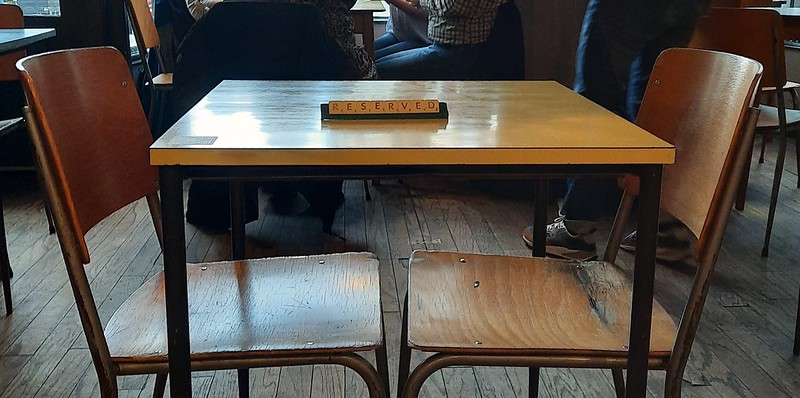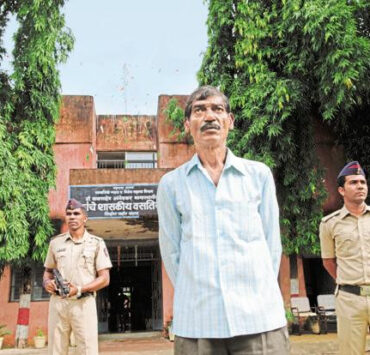
By Kalpana Sharma

The Network of Women in Media, Mumbai, called this meeting because we felt that there needed to be space for other voices to be heard on the reservation controversy. We also felt that the media had not given enough time and space for these voices. With this in mind, two students and a professor from IIT, Mumbai were invited to speak. The writer Anil Teltumbde had also been invited but he cancelled at the last minute.
We began with presentations from Neilratan Shende and Sai Thakur, both PhD students at IIT and members of People for Social Justice. Neil outlined why they had set up the organisation. He explained that initially the anti-reservation protest in IIT was not an organized one. But when the anti-reservation students formed a human chain, those who were for reservation felt that they should also speak up. Initially, five of them stood near the human chain carrying pro-reservation posters. To their dismay, they found that even though their protest was in the vicinity of the anti-reservation students, and several journalists from the news channels interviewed them, none of these interviews were aired. The bias of the media was so evident in the way they have reported the pro-reservation voices coming from us. In fact, one of the newspapers (Navbharat Times, May 25, 2006) gave our photograph misquoting us as anti-reservationists protesting at Azad Maidan!” states their printed one page note which they circulated. Neil also explained that some of them had already been involved in issues like teaching slum children, the rehabilitation of people affected by various developmental projects etc. But when they realised that their voices were being ignored, they decided to come together to form People for Social justice.
Neil said that he felt that reservation was one of the modes through which social equality could be achieved. He added that he felt globalisation aggravated the handicaps that the poor already faced. He also said that he questioned the concept of merit” and felt it was a social construct. He pointed out that institutions like Harvard University had worked out a way of assessing students that was not based only on the academic qualifications because they recognised that this was not an adequate basis. Thus, the character of the applicant, his or her commitment to serving the community and the hardships they have faced were taken into account before looking at academic qualification. This had ensured that there was a fair representation of all communities in the student community. Merit is not inherited”, he said, it can be acquired”.
Sai made a very comprehensive presentation on the genesis of reservation. She pointed out that caste remained a reality in India that could not be ignored. If one accepted that merit was not pre-determined by birth, or race, or class, then one had to work out how to ensure that the scheduled castes and tribes in this country got a share proportionate to their population in education. She also felt that many of the misconceptions on the reservation issue had been aided by the way the media reported on it. We can ask Sai to send us a soft copy of her presentation, which can be circulated. It was very well argued and is worth reading in its totality.
The third speaker was Professor D. Parthasarthy from the department of humanities and social sciences at IIT.
Professor Parthasarthy also questioned the media representation of the controversy. He pointed out that some of the statements made in the course of the debate were against people who are also citizens of this country. Is caste only restricted to the matrimonial columns of newspapers?” he asked. What merit are we talking about when the educated make uninformed statements”, he said referring to people claiming that there was no caste, or giving wrong information about reservation.
As a teacher, he said that the challenge was to see how to make reservation work. The system at present was not adequately geared for this. Teachers were not willing to go the extra mile to help students who came into institutions like IIT with a lack of cultural capital”. The system, he felt, had to be responsive to the needs of such students, to recognise their seriousness of intent and then see what could be done to help them. He quoted from a study done of all the five IITs that showed that a greater effort needed to be made to integrate students who had entered through the reserved category and that steps had to be taken to ensure that there was no discrimination once they had gained entry.
After this we had a lively discussion with different points of view being shared and questions asked. For instance, the question that has often been aired during the media debates on reservation also came up. Why do these students want to enter elite” institutions when what is needed is primary education? It was pointed out these were completely false choices that were being brought up and that the issues were separate and had to be looked at separately. While there was no dispute that universal primary education was essential, the question being debated today was how do we ensure that those from the deprived groups who had managed to get through school actually got a chance of getting into elite” institutions.
The issue of how do we really know how many castes there are and how many OBCs also came up. One journalist suggested that there should be a demand for a caste-based census, something that has not been done since 1931. However, Sai pointed out that there had been two commissions that had put together a list of OBCs and that this information was available.
Another professor from IIT intervened and said that he had found that all students, regardless of caste, needed help at the beginning. While some from the reserved category might have problems with English or with some subjects, others had personal problems or found the course too difficult, or had fears that they would not succeed. He said teachers who were sensitive could work out a way to make themselves available to students rather than appearing unapproachable.
There were many more questions and responses. The small conference room was packed. At the end at least one student from IIT, who was anti-reservation came up to me and said he had benefited from the discussion because it had taken place without any rancour and all points of view were aired. He said that although there had been some debates in IIT, the anti-reservationists had dominated most of them and the other voices had just not been heard.
The media’s role in this whole issue came up repeatedly. We announced that we were doing a survey of the print media and would make our findings public as and when they were ready.
Venue: Press Club, Mumbai
Date: 10 June 2006



